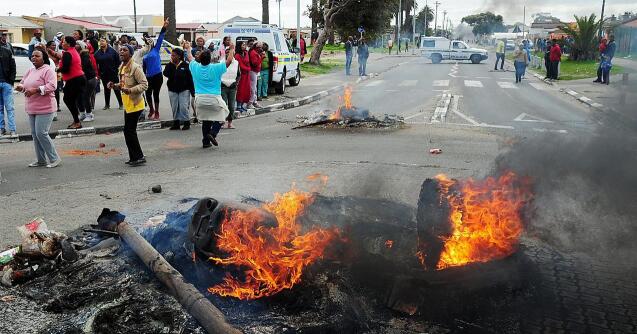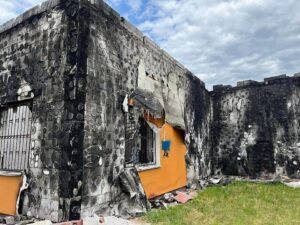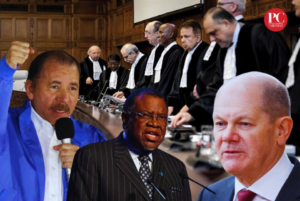Picture: David Ritchie/African News Agency (ANA) – Tenders are used for personal gain and distributed to friends and family members for kickbacks, hence poor service delivery in some municipalities. Communities then tend to resort to violence to communicate their grievances to the government, say the writers.
By Olerato Carol Manyaapelo and Sethole Florence Ramasela
Only 16% of South Africa’s 257 municipalities received a clean audit in the Auditor-General’s report for the 2020 financial year.
Furthermore, only 41 municipalities received a clean audit with no findings, while 100 others received unqualified audits with findings and 25 municipalities produced inaccurate financial statements.
Auditor-General Tsakani Maluleke stated that the most recent audit had revealed that there had been no improvement in audit outcomes over the year, revealing the pitiful state of municipal accountability, performance and integrity.
She further added that only 33 municipalities had received clean audits in 2016/17. It is no secret that the majority of South African municipalities are underperforming and deliver exceptionally poor service due to corruption, cadre deployment and nepotism.
The majority of municipalities are led by elites who are self-interested and self-serving. Every year there are service delivery protests in South Africa and allegations of maladministration and misappropriation of funds by municipal officials.
It is completely disheartening to see provinces continuing to perform poorly, year after year, even in 2022.
It is recorded that the Western Cape province tops the list of those with clean audits, while the Free State is at the bottom. No municipality within the Free State province received a clean audit in 2020/21, demonstrating the complete failure of municipal management in the province.
In fact, the most recent audit revealed that the financial health of South Africa’s municipalities has deteriorated further, with only those in the Western Cape and Limpopo provinces displaying any encouraging signs of local government correcting its financial difficulties.
Of the 257 municipalities in South Africa, 22 of 41 best performing ones, with clean audits, were in the DA-run Western Cape. However, municipalities in Limpopo province had shown a consistent improvement over the previous five years, which was very encouraging.
The local government’s lack of accountability and failure to act and stop the downward slide, characterised by the lack of inadequate service delivery was an “indictment” of municipal management.
She stated that her office has emphasised the need to reinforce fundamental financial and performance management practices on numerous occasions, as well as the vital importance of protecting and maintaining municipal infrastructure and resources.
In October 2021 the Public Protector’s office launched an investigation into the Ditsobotla Local Municipality in the North West province as the municipality was accused of nepotism.
The municipality was being run as though it were a family business by unqualified individuals. How can an unskilled and unqualified individual run the municipal finances? In June 2022, the Hawks were investigating corruption cases in 17 of the 39 municipalities in the Eastern Cape Province.
This is indicative of how endemic corruption is within municipal offices in South Africa and how comfortable and accepting officials are of corruption.
Tenders are used for personal gain and distributed to friends and family members for kickbacks, hence the poor service delivery. People without skills or qualifications are given multibillion-rand tenders, and the process of double quoting and corruption continues unabated.
In Orange Farm Ext 1 Lakeside in Johannesburg, community members had no electricity for three years. How is it possible that a municipality could go this long without delivering absolute basic services such as electricity?
In the first week of August 2022 protests in Tembisa against the high cost of living and the lack of service delivery escalated into violence and a looting spree, as residents took to the streets to vent their anger.
They damaged government properties and four people were left dead. This type of behaviour is unacceptable and cannot be justified, but unfortunately, it looks as though this is the only language that the South African government understands.
Hence, communities tend to resort to violence to communicate their grievance to the government.
The State tasks local governments with the responsibility to safeguard the general welfare, health and safety of its citizens.
But what happens when people who are tasked with taking care of the populace rob them instead? Numerous factors contribute to corruption, including poverty, a lack of skills, personal greed and power relations.
There is also an acceptance of corrupt behaviour, a lack of accountability, inadequate policing and no apparent consequences for those officials who plunder the coffers or manipulate the system for personal gain.
It should also be noted that some municipalities have been captured to serve private interests and are impacted by rampant abuse of power and resources. It is apparent that steps have been taken, as a matter of urgency, to ensure that municipal operations are handled properly.
First, there has to be a revival of a national conversation and focus efforts on effective ways to lessen corruption and enhance ethical behaviour among South Africans in all spheres of life.
Secondly, local government officials need to place service delivery at the top of their agendas and ensure that municipalities implement the 13 chapters of the National Development Plan.
Lastly, the level of corruption in local municipalities needs to be addressed urgently and public servants have to be held accountable for their acts of corruption and misuse of state funds. The law must play its part in prosecuting those who continue to steal from citizens.
Olerato Carol Manyaapelo and Sethole Florence Ramasela are Junior Researchers at the University of Johannesburg’s Institute for Pan-African Thought and Conversation (IPATC).
This article is original to the The African. To republish, see terms and conditions.




